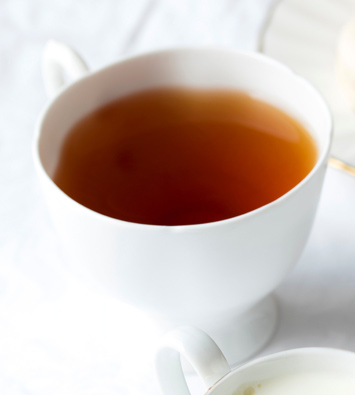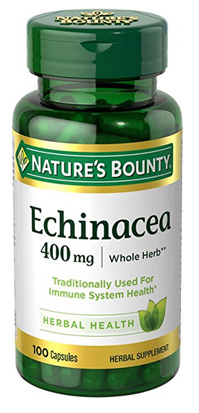Health Benefits of Echinacea and Echinacea Tea

Are you under the weather, having a cold, or simply keep getting sick all the time? You may want to try Echinacea. People report that they feel much better after taking this great supplement in the morning.
Echinacea is a herb with many wonderful health benefits. Its medicinal properties have been discovered long time ago, probably when the Native American people observed elk seeking out and consuming this plant when sick.
The Native Americans had echinacea in their medicinal arsenal and used it to treat snake and poisonous insect bites. The Great Plains Indians also used Echinacea as a powerful painkiller. The Native American tribes also used it as a remedy against eczema, psoriasis, skin problems, and for wound healing.
The echinacea plant itself is nothing short of beautiful and showy. This plant native to the plains between Texas and Canada can grow up to a height of 2 feet.
Health Benefits of Echinacea
Its medicinal properties are contained in the root, leaves, stems, and flowers. They promote wound healing and act as a blood purifier.

In addition, Echinacea has anti-oxidant, antiviral, antibacterial, anti-inflammatory, and immune-promoting properties.
The most common health benefit of echinacea is its use in treating and prevention of colds. To ensure greatest effectiveness, it should be taken at the first signs of cold. However, like many herbs, its use is controversial. You will find people who claim it does nothing, while others swear by its effectiveness.
Echinacea also seems to work toward preventing viral colds. What’s even more astonishing, it seems to strengthen the immune system were when it comes to recurring infections.
Apart from being a natural cold remedy, Echinacea may be used as a treatment against cough, caker sore, hives, herpes, hemorrhoids, sinus infection, sore throat, stomach flu, urinary tract infections, yeast infections, wounds, and bee sting.
Echinacea can help your body fight cancer because of the phytochemical compounds in this herb.
A less known benefit of Echinacea is related to ADHD disorder. ADHD stands for attention deficit hyperactivity disorder, which basically means having problems controlling one’s behavior and paying attention. Echinacea is a natural remedy if applied in the right dosage.
 Echinacea may have an indirect effect on blood thinning. It does so by improving the health of the platelet cells in your blood. Echinacea’s anti-oxidative properties help protect these cells from oxidative damage. Thus, taking echinacea supplements or tea might help prevent blood disorders due to platelet damage. But the full extent of its action is still not very well understood.
Echinacea may have an indirect effect on blood thinning. It does so by improving the health of the platelet cells in your blood. Echinacea’s anti-oxidative properties help protect these cells from oxidative damage. Thus, taking echinacea supplements or tea might help prevent blood disorders due to platelet damage. But the full extent of its action is still not very well understood.
Echinacea is a natural fighter of infection. It does so in an indirect way, by boosting the immune response of your body (immunostimulation). That means it helps your body produce more white blood cells responsible for safeguarding your body. A traditional antibiotic will kill bacteria directly. By contrast, echinacea helps your immune system fight on its own.
Echinacea is also able to kill some types of viruses, most notably the flu and common cold virus.
So, it is entirely up to you if you are going to use the extract of this herb to strengthen your immune system. If you do, you can choose between capsules and tea.
Echinacea Capsules are very popular and a great home remedy for colds and the dreaded flu. 
Some people, including myself, enjoy sitting comfortably and drinking a nice, steaming cup of Echinacea Tea during cold season. It tastes great with a little bit of honey.
Drinking Echinacea tea is considered effective as a cure for chronic constipation. Drinking one cup of this tea daily can help you loosen the bowels.
Side Effects
You shouldn’t take echinacea if you have tuberculosis, leukemia, diabetes, multiple sclerosis, connective tissues disorders, lupus, autoimmune disease, or if you are taking immune-suppressive drugs.
If you are breastfeeding, echinacea has a plant safety rating of ‘B’. May not be appropriate for self-use by some individuals or dyads, or may cause adverse effects if misused. Seek reliable safety and dose information.
Side effects of Echinacea are generally associated with allergies. People allergic to ragweed, chrysanthemums, or asters shouldn’t take echinacea. Side effects may be worse in case of asthma or allergies.
Occasionally, echinacea may cause temporary numbness or tingling on the tongue. Other possible side effects include nausea, fever, stomach pain, diarrhea, dizziness or muscle aches, however, it is generally considered safe for short-term use.
The Bottom Line
Should you try Echinacea? It’s your call.
But if you belong to the category of people that swear by its effectiveness and whose counter is permanently stocked with this supplement, it can certainly help you. It can help you prevent colds, but it will also help you once you have the symptoms. And you may be surprised by how fast you will be back to one hundred percent of your normal functioning.
The best thing you can do is try to feel if there’s any effect from taking supplement or drinking the tea. It works great if you can couple it with some Vitamin C or freshly squeezed lemon juice.

Leave a comment